The Best Quoting Software
Quoting software can help you streamline creating, managing, and sending price quotes to potential customers. We tested and ranked the best systems for various industries, including manufacturing, construction, professional services, and retail.
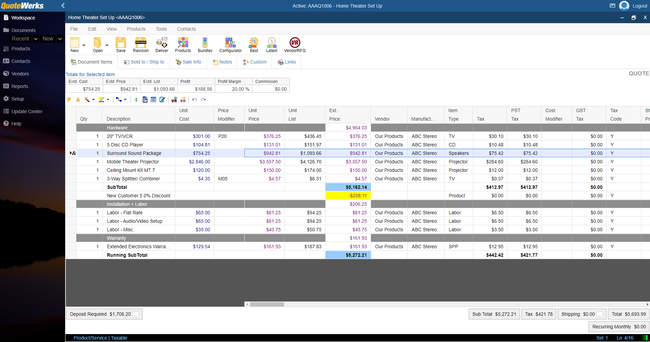
- Autofills customer data from CRM
- Centralized quote storage system
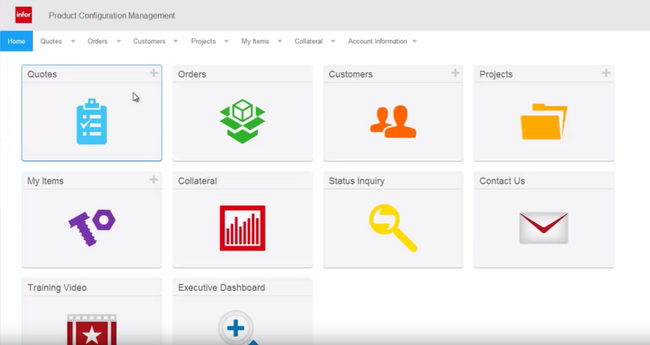
- 2D and 3D visualization for configurations
- Supports ERP and CRM integrations
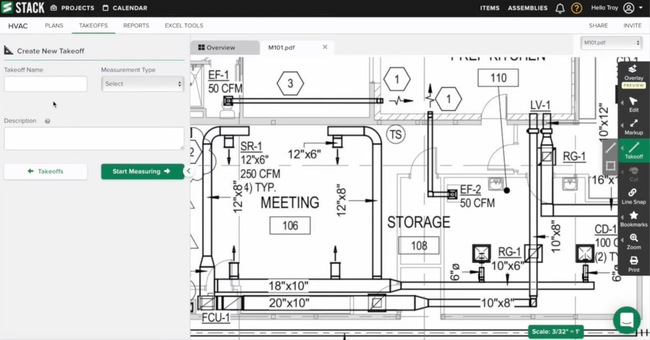
- Easy to use and modern interface
- Free version available
- Unlimited takeoffs in paid version
Using our review methodology, we evaluated and selected our top systems for quoting, including QuoteWerks, Infor CPQ, and STACK.
- QuoteWerks: Best Overall
- Infor CPQ: Best Manufacturing CPQ
- STACK: Best Construction Quoting and Estimating
- Quoter: Best for Managed Service Providers
- PandaDoc: Best for Professional Services
QuoteWerks - Best Overall
QuoteWerks offers customizable and professional quote templates, enabling you to create polished documents that align with your business branding. These templates can include personalized logos, brand colors, headings, footers, and other elements.
When creating a quote, you can select a base layout or create a new one in the QuoteWerks template editor. Then, you can add design elements and fields to match your company’s branding and quoting requirements. For example, you’re at a SaaS company with a client interested in a subscription plan for 100 users. Using QuoteWerks, you can select a pre-designed SaaS template with sections for service descriptions, pricing tiers, and an SLA.
The system will automatically populate the customer’s data onto the quote, such as their name, company, and pricing. It also includes a section showcasing various discounts for larger volumes.
QuoteWerks can trigger an internal review for the higher-value deals, ensuring management approval before sending it to potential clients. Once approved, you can export the quote into a PDF and send it to your customer.
QuoteWerks offers three different pricing tiers, starting at $15/user/month and extending to $30/user/month. Pricing can also vary depending on whether you sign an annual or monthly contract or opt for a one-time purchase.
Infor CPQ - Best Manufacturing CPQ
Infor CPQ’s dynamic pricing feature enables you to generate precise pricing for products and services based on material costs, labor rates, discounts, and configuration options.
Once you define your pricing rules, Infor CPQ will pull real-time data on inventory, production costs, and customer-specific pricing agreements. Your sales team or customers can then configure products through a guided interface. As they update the configurations, the dynamic pricing engine will recalculate the price in real time.
This dynamic pricing capability can be highly beneficial if you have niche products like custom furniture. This way, customers can use Infor CPQ to design a dining table, selecting which wood type, dimensions, and finish they prefer. The system can calculate the table’s cost based on the wood prices, labor, and shipping costs.
If the customer happens to order 10 of these custom tables for their business instead of one, the software will automatically apply a bulk discount. Infor CPQ is best suited for manufacturers and industries requiring complex product configurations, specifically machinery, industrial equipment, automotive, and aerospace.
STACK - Best Construction Quoting and Estimating
STACK’s takeoff tools can streamline measuring and quantifying materials, labor, and costs directly from blueprints and project plans. These tools are essential to construction professionals as they can help prepare detailed and accurate project estimates and quotes.
First, you must upload your project plan into STACK’s platform. The system supports formats like PDF, CAD, or image files to ensure compatibility. You can calibrate the blueprint by setting the correct scale or measurement unit.
STACK’s drawing and clicking tools allow you to highlight areas such as floor plans or plumbing layouts or count specific items, like light fixtures or windows. The system will calculate the precise quantities based on your input.
You can also utilize the software’s area measurement tool, which measures the total square footage of flooring required for carpet installation. It can also calculate the volume of concrete needed for a parking lot foundation.
The system’s item and assembly linking feature will add all the material costs to the takeoff measurements. Each task will also factor in labor costs. Once you complete the takeoff, you can save it in STACK, allowing you and your team to reference or duplicate the work in the future.
Quoter - Best for Managed Service Providers
Quoter’s revenue support tool can simplify creating, managing, and tracking recurring billing for subscription-based services, which are central to MSP operations. This process ensures a steady cash flow and helps minimize manual errors.
With Quoter, you can create quotes tailored to your client’s needs, such as incorporating offerings like managed IT support and software licenses. Your clients will receive their quotes via email, which they can electronically approve. You can then convert the accepted quote into a subscription or a contract.
Once your client activates a subscription, Quoter will schedule automated invoices and connect them to payment gateways for automatic billing. You can monitor the ongoing services, adjust pricing, and renew contracts automatically.
The system will send an automated email to your client with a summary of the services before the annual renewal. This email will also include an option to renew their subscription or upgrade.
PandaDoc - Best for Professional Services
PandaDoc’s e-signature integration lets you collect legally binding electronic signatures directly within your documents, streamlining the signing process and eliminating the need for third-party tools. This ensures compliance with laws such as the ESIGN Act, UETA, and eIDAS for secure agreements.
You can create and import documents with the necessary signature fields using PandaDoc’s drag-and-drop editor. You can define the roles and the order of signers, such as the client first, the manager second, and then the internal legal team. After sending the document, you’ll receive alerts when the client views and signs the contract.
Once your client completes their part, the document will automatically route back to you and then your legal team for final review. All parties can sign the document on the go, whether in the office or traveling. PandaDoc will store the completed contract with an attached audit trail for future reference.
PandaDoc is a highly affordable system that starts at $35/seat/month, compared to Quoter who starts at $149/month.
What is Quoting Software?
Quoting software automates the proposal process for B2B and B2C sales. A subset of “configure, price, and quote” (CPQ) systems, quoting software focuses on calculating costs, managing customer relationships, and streamlining the request for proposal (RFP) process. An automated quoting software can dramatically expedite the quote proposal and approval process for various products and services.
While quoting systems help you share proposals with clients and customers, it also helps you better understand costs so you can find opportunities for savings on your end of the transaction. As a result, quoting software lets you save time and money throughout the entire quote proposal process.
Features
- Automated quote generator: Build custom quotes through an automated template generator, which includes complex pricing and other relevant quote information
- Price rules engine: Set automatic pricing rules for your products and services based on specific rules, such as labor or material requirements
- Discount management: Create conditions to apply discounts, sales, and clearance pricing on various products and services
- Price and quote management: Maintain detailed records of pricing rules from previously sent quotes
- Product configuration: Allow clients and customers to customize their products before sending out a quote proposal
- Customer profiles and contact management: Store contact information about clients and customers, ranging from addresses, e-mails, and phone numbers to personal details about each account holder
- E-signature collection: Allow clients and customers to digitally sign and accept quote proposals online
- Invoice generation: Once a quote has been accepted by a client, automatically generate a matching invoice
- Online payment portal: Accept payment for quotes through an easily accessible payment portal
Benefits
Expedited Quote Generation
Building an accurate quote for a client takes time, especially if you have to calculate many independent variables. Manually calculating the final price can waste a lot of valuable labor. While some basic quotations can be completed in a few hours or days, particularly complex proposals can take weeks or months to complete, depending on the project’s scope.
Fortunately, quoting software automates the process with customizable templates, even for complex products and services. By using an auto quote generator, you get faster price results, which can then be sent to clients in minutes instead of days. Those formerly month-long proposals can be finished in a fraction of the time, giving the sales team more time to focus on new leads.
Reduced Human Errors
Another downside of manual quote calculation is the possibility of human error. Every variable accounted for is an opportunity for a mistake. If an incorrect proposal is sent to a customer, it can lead to an expensive misunderstanding and lost client trust.
Using a quoting software algorithm to generate complex prices leads to fewer errors. The custom price rules engine does all the calculations for you, even with complex variables. You can rest easy and safe from costly misquotes.
Customized Pricing
In addition to reducing errors and speeding up the proposal process, quoting software allows for more flexibility with cost estimates. With software automation, you can adjust total prices based on individual product variables like:
- Size
- Bulk purchasing
- Colors
- Accessories
- Bundles
- Shipping methods
As long as you have your business rules set in advance, you can get an accurate quote for your most complex products generated in a fraction of the time of your manually calculated quotes. This interactive process also increases customer satisfaction, as each user can take the time to select every option they need at their own pace.
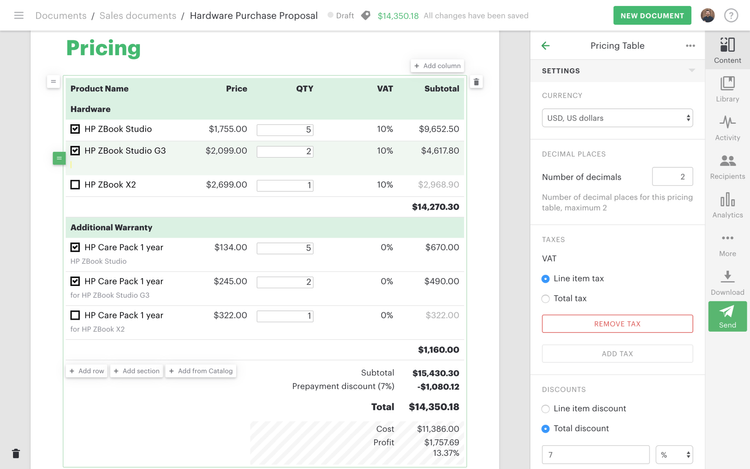
Faster Quote Acceptance
By sending quotes faster, you can receive responses faster too. Automated proposals can be sent as soon as they are completed, ready for customer approval. Digital quotes can also be sent out online, further reducing delays from sending traditional proposals through the mail or a courier service. This is especially beneficial for sales team members with multiple proposals to get out in a single day, as they don’t have to go through the hassle of addressing multiple envelopes or figuring out postage.
E-signature collection and online payment portals further expedite workflow. Once received, a customer can digitally sign the proposal electronically, allowing work to begin. And since they can also pay online, even with credit cards, the transaction can be completed in real time. The sales department can send out multiple quotes in the morning and distribute customer-approved projects by the afternoon.
Additionally, you can set automated reminders to contact clients about active proposals. Depending on the type of project, these follow-ups can range from days after a quote is sent to weeks or months.
Build Better Customer Relationships
Customer relationship management (CRM) tools are another valuable part of quoting software. The first is through the creation of detailed customer profiles which can include everything from basic contact information to personalized notes about the client.
Setting up customer profiles with a CRM allows you to review pertinent information before sending a quote proposal, increasing your chances of success. Keep in-depth notes on various clients, such as their buying habits and past sales history with your company. This information can be used to tailor quotes to each specific customer better.
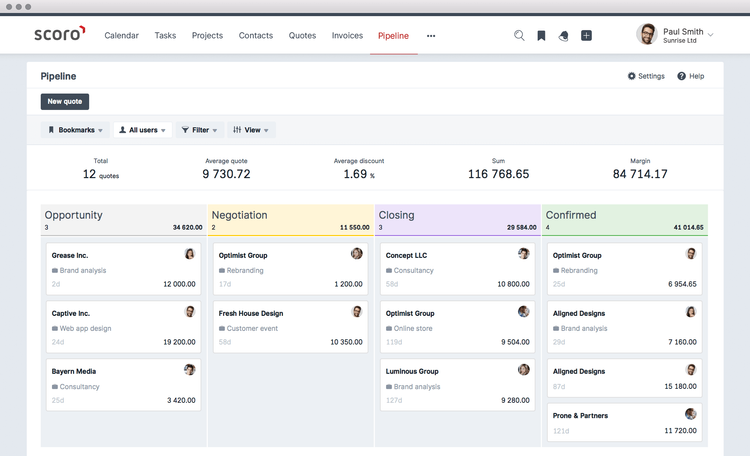
Pricing Guide
| Software | Deployment Options | Starting Price |
|---|---|---|
| QuoteWerks | Cloudl | $15/user/month |
| Infor CPQ | Cloud or On-Premisel | N/A |
| Stack | Cloud | $2,999/user/year |
| Quoter | Cloud | $149/month |
| Pandadoc | Cloud | $35/seat/month |
Quoting software can range from $15 - $570 per month. Pricing will range depending on the number of users and how many quotes you create per month.
Our most affordable option is QuoteWerks, with pricing starting at $15/user/month. However, this pricing can quickly increase depending on how many users you require and if you need additional customizations. On the other hand, Quoter is one of our pricier options upfront, but each plan offers unlimited users. Stack is our most expensive option, with pricing starting at $2,999/user/year.


















